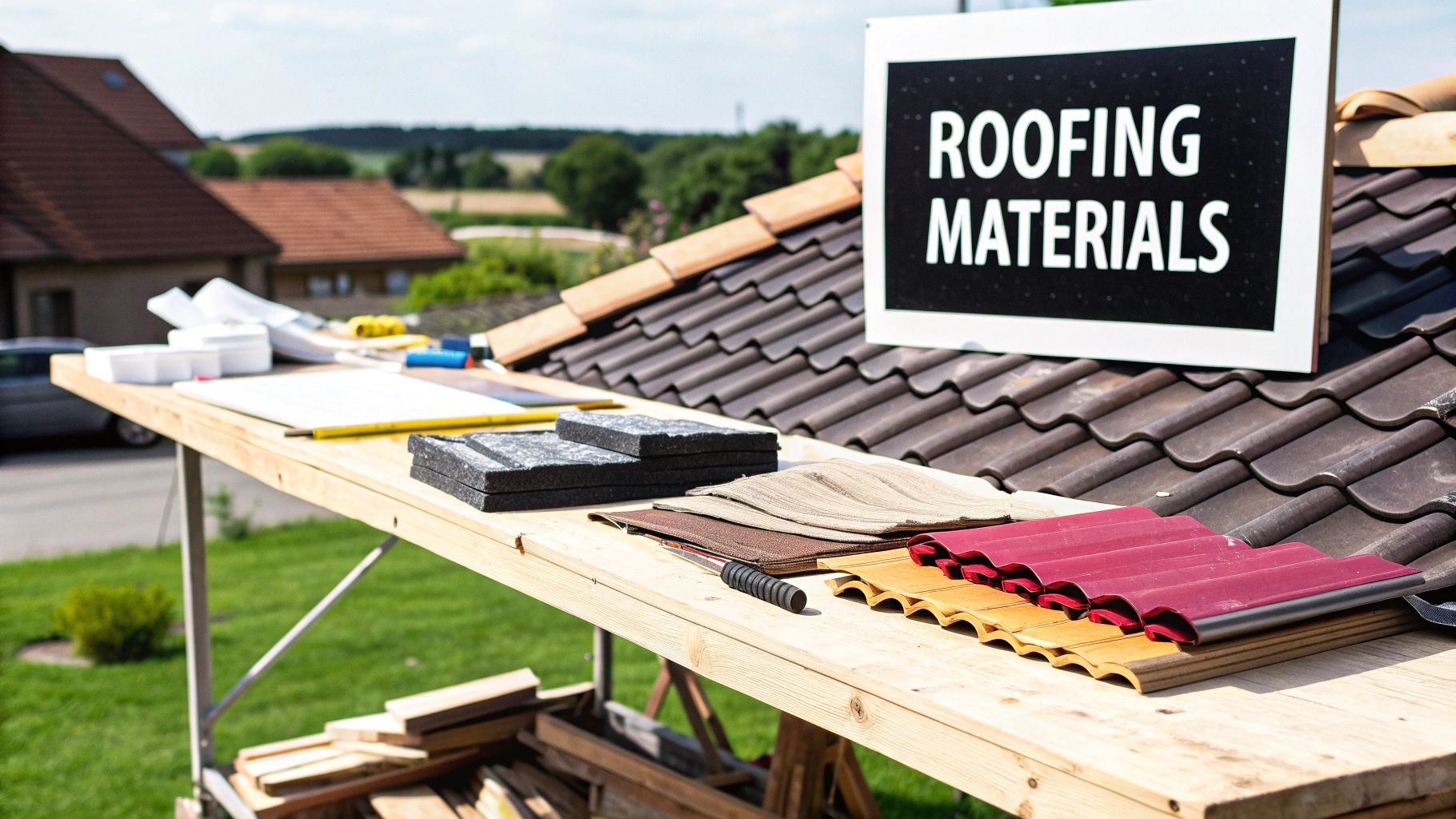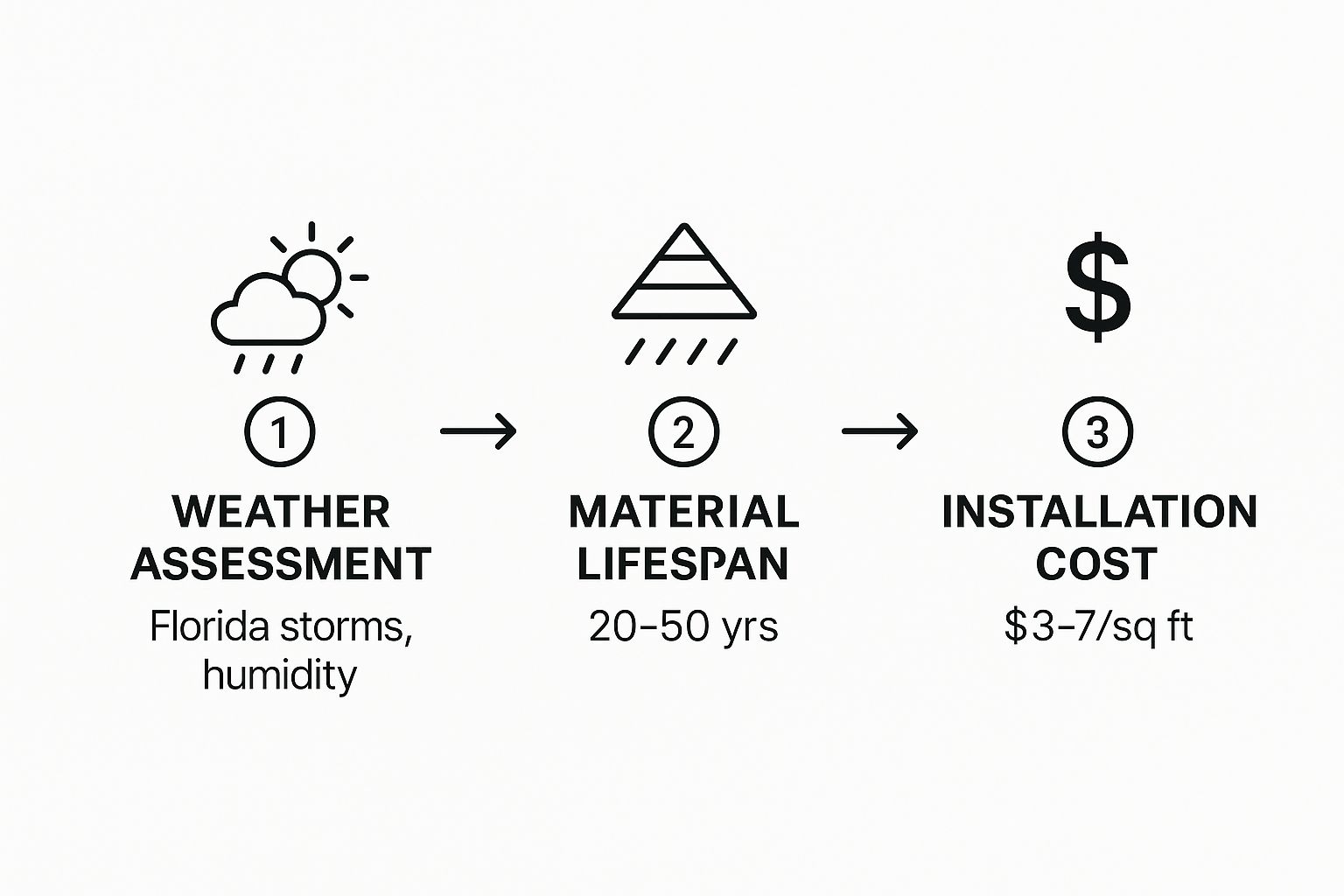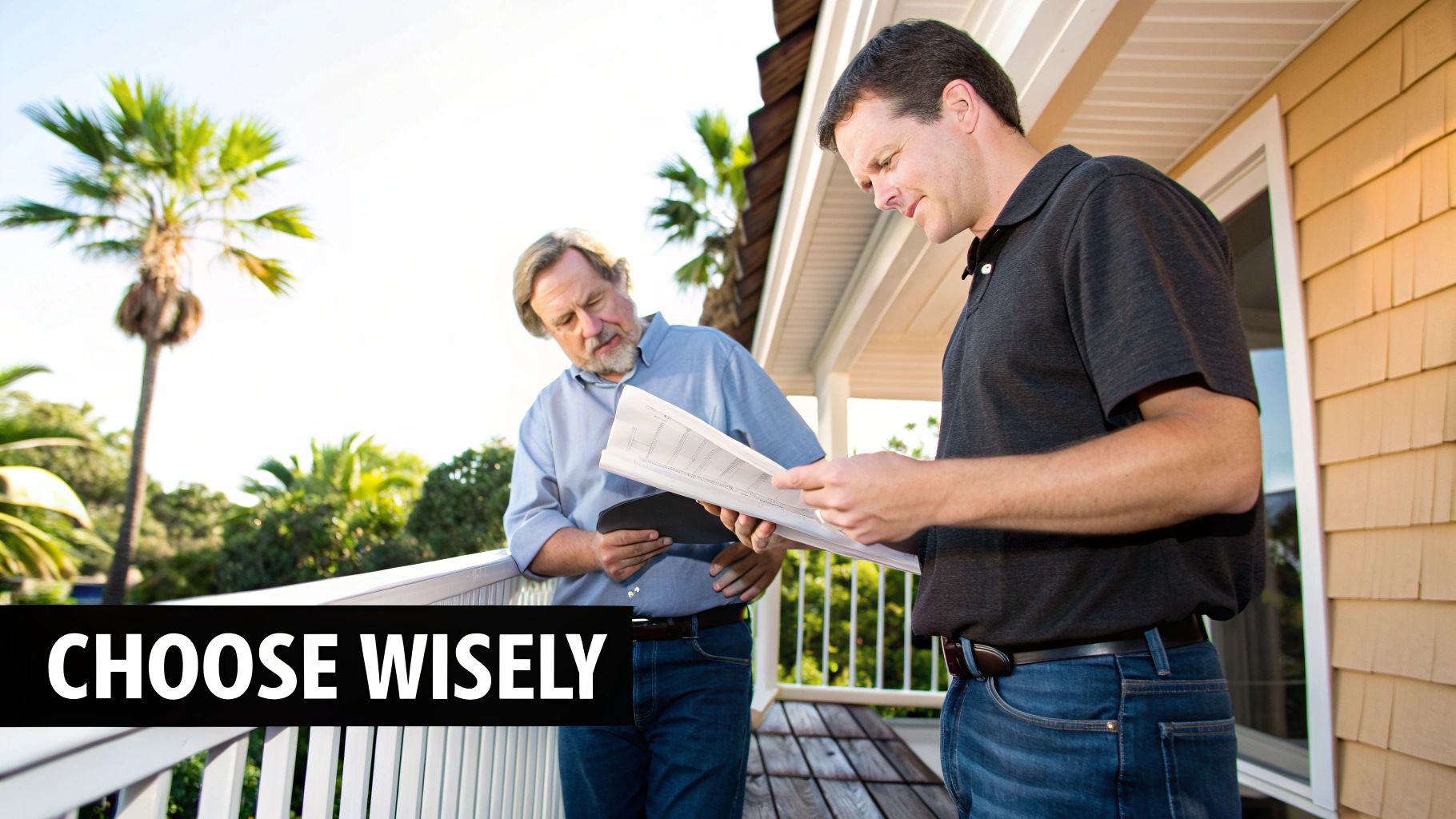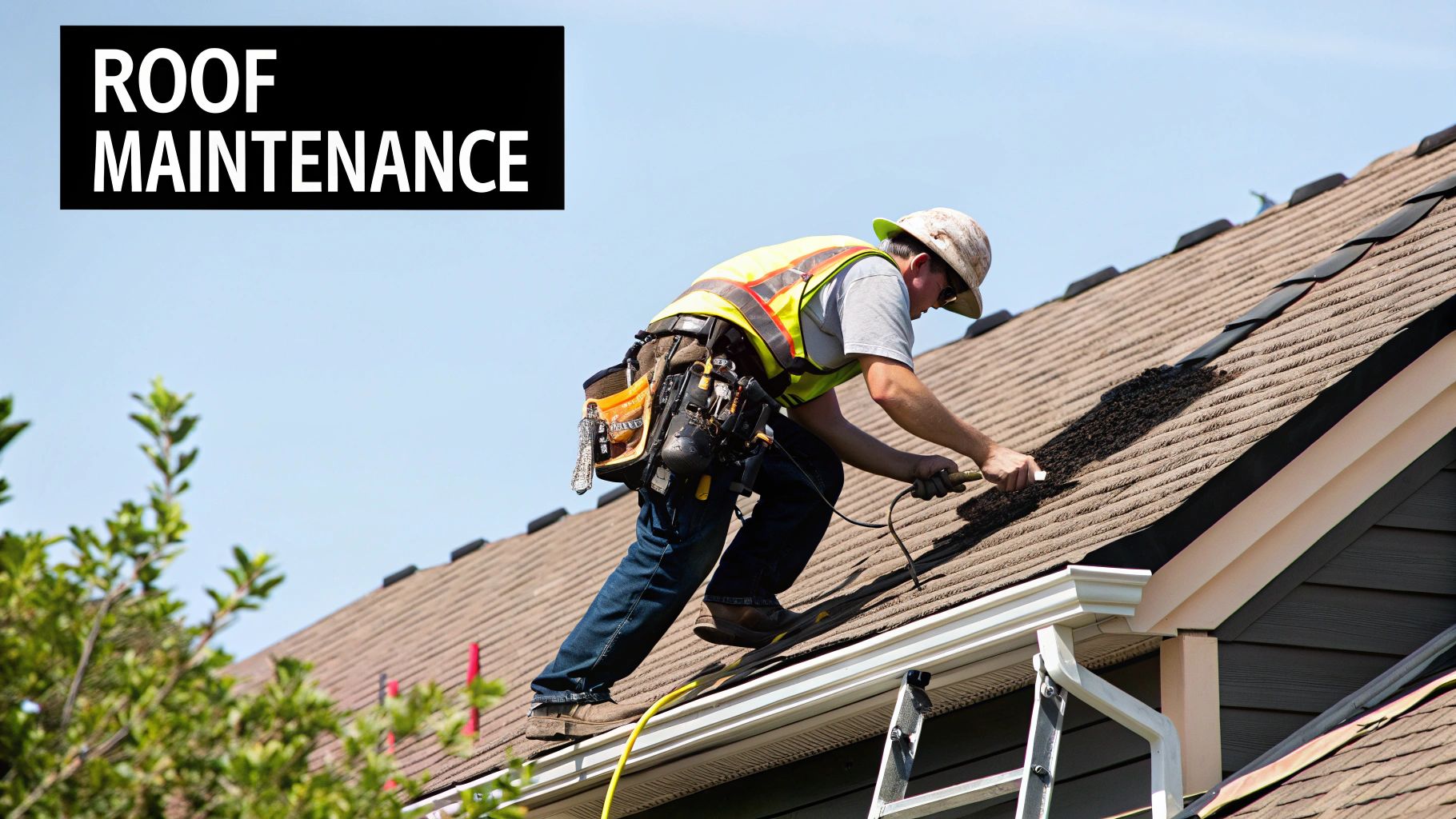Let's be honest, picking a roofing company in South Florida is a high-stakes decision. With our relentless sun, crushing humidity, and the ever-present threat of hurricanes, a simple mistake can turn into a catastrophe.
You're not just hiring someone to nail down shingles; you're entrusting a partner with the protection of your biggest investment. This isn't about getting the cheapest price—it's about finding a professional whose work will stand up when a Category 3 is knocking on the door.
Your Guide to South Florida's Roofing Market
Finding the right team in the Miami, Fort Lauderdale, or Palm Beach area means cutting through a lot of noise. The standards are just plain higher here. A roof that works perfectly fine in another state might fail spectacularly under the stress of our weather.
This guide provides the actionable, non-negotiable criteria you must use to screen any potential roofer. Before you waste time on estimates, you need to know who's even qualified to be in the running.
The Non-Negotiables for Any Florida Roofer
Before a roofer ever sets foot on your property, there are three absolute must-haves. These aren't just suggestions; they're the bare minimum that separates a legitimate professional from a risky gamble. Think of this as your first line of defense.
To quickly vet any company, ask them to immediately provide proof of:
- A Valid Florida State License: This is your first and most critical check. It’s proof they've met the state's competency standards.
- General Liability Insurance: This is what protects your property from accidental damage during the project. It's a safety net for you.
- Workers' Compensation Insurance: This is crucial. It protects you from being held liable if a crew member gets injured on your property.
Actionable Tip: Any roofer who gets defensive or hesitates when you ask for their license and insurance certificates is a massive red flag. A true professional will have this information ready and will be proud to show it. Disqualify them immediately.
Skipping this step is rolling the dice with your financial future. If an uninsured worker falls off your roof, you could be on the hook for their medical bills. Hiring an unlicensed contractor means you have zero recourse if they do a shoddy job or, worse, take your deposit and disappear. This initial background check is the most important 5 minutes you'll spend on your search for roofing companies in South Florida.
To make this even easier, we've put together a quick checklist you can use to screen any company before you even invite them out for a quote.
Quick Vetting Checklist for South Florida Roofers
Use this checklist for an initial screening of any roofing company before requesting a formal quote. It helps you weed out unqualified or risky contractors from the very beginning.
| Verification Item | Why It Matters in Florida | How to Verify |
|---|---|---|
| State License | Ensures the roofer meets Florida’s strict building code and competency standards for hurricane-prone areas. | Check their license number (e.g., CCC, CRC) on the Florida DBPR website. |
| General Liability Insurance | Protects your home and property from any accidental damage caused by the roofing crew during the project. | Ask for a current Certificate of Insurance (COI) and call the insurance agent listed to confirm it's active. |
| Workers' Comp Insurance | Shields you from personal liability if a worker is injured on your property. This is a must-have in a high-risk trade. | Request their Certificate of Insurance for workers' comp and verify its status. |
| Local Physical Address | A local office shows they are an established part of the community, not a "storm chaser" who will disappear after the job. | Google their address to see if it’s a real office, not a P.O. Box or a shared virtual space. |
Getting these basics confirmed upfront saves you a world of headaches later on. If a company can't pass this simple test, they don't deserve your business. Period.
Decoding Licenses and Insurance

Once you've shortlisted a few potential roofers, the real vetting begins. This isn't just a box-ticking exercise; it's about protecting yourself from serious financial and legal headaches.
In South Florida, a roofer's license and insurance are your two biggest shields against shoddy work and on-site accidents. Many homeowners don't realize there's a huge difference in contractor licenses here in Florida, and hiring someone with the wrong one can bring your project to a screeching halt.
Registered vs. Certified Florida Contractors
Not all licenses are created equal. The state issues two distinct types, and understanding the difference is crucial.
- Registered Contractor (RX, RG): A local license. A registered contractor is only permitted to work in the specific cities or counties where they've registered. To take a job one county over, they must go through that county's separate registration process.
- Certified Contractor (CCC, CRC): A statewide license. A certified contractor has passed a comprehensive statewide exam and can legally work anywhere in Florida. This is the mark of a more established, professional company.
So, what does this mean for you? A roofer who is only registered in Broward County can't legally start a job in Miami-Dade. For homeowners living near county lines, this is a make-or-break detail. A certified contractor has met a much higher standard and gives you more flexibility and peace of mind.
Actionable Tip: When you vet roofing companies in south florida, always prioritize a Certified Contractor (CCC). It means they have statewide authority, which simplifies permitting and confirms they've passed the toughest exam Florida offers.
How to Verify a License Yourself
Don't just take their word for it. You can—and absolutely should—verify their license in about five minutes. The Florida Department of Business and Professional Regulation (DBPR) has a public portal just for this.
Go to the DBPR website and use their search tool by company name, license number, or owner's name. Look for a license status that says "Current, Active." If you see "delinquent," "suspended," or "revoked," cross them off your list and move on.
Understanding Your Insurance Shield
A valid license is just one piece of the puzzle. The contractor must carry two critical types of insurance to protect you from liability. If they don't, a simple accident on your property can turn into your personal financial disaster.
These two insurance policies are non-negotiable:
- General Liability: This covers any damage the roofing crew might cause to your property. A ladder falls and smashes a window? A tool drops and wrecks your A/C unit? This policy pays for it, not you.
- Workers' Compensation: This is the most important one. It covers medical bills and lost wages if a worker gets injured on your job site. Without it, you could be sued directly for those costs.
When a roofer gives you their insurance certificates, don't just file them away. Take this extra step: call the insurance agent listed on the certificate to confirm the policies are active and the coverage amounts are sufficient for your project. That one phone call buys you complete peace of mind.
Selecting Hurricane-Resistant Roofing Materials
Here in South Florida, your roof is your home's main line of defense against some of the most intense weather on the planet. A standard-issue roof isn't built to handle a hurricane's high winds and driving rain. Choosing the right materials is more than an aesthetic choice—it's a critical decision that directly protects your home and family.
Think beyond just the shingles or tiles. You need to understand the entire roofing system, from the underlayment that seals the deck to the specific fasteners holding everything down. Arming yourself with this knowledge lets you cut through the sales pitch and ask the questions that really matter.
Material Strength And Wind Resistance
Not all roofing materials are created equal when a hurricane is bearing down. Metal roofs, for instance, are the heavyweights in this category, known for their incredible durability and often rated for staggering wind speeds. Clay and concrete tiles are also fantastic choices, bringing that classic Florida style while offering serious resilience.
In our unique climate, a hurricane-resistant roofing system is non-negotiable. Metal roofing can withstand wind speeds up to 180 mph, while clay and concrete tiles hold strong against winds up to 130 mph. Modern installation methods also incorporate hurricane straps and clips for extra security. Want to know more? Check out these other key roofing trends in South Florida to see how all these pieces fit together.
This chart breaks down the big-picture factors you'll need to weigh.

A smart decision balances our local weather challenges, how long the materials will last, and the installation costs. It’s all about finding the right balance for your investment.
Installation Techniques That Matter Most
The best materials on the market are useless if they aren't installed correctly. In a hurricane zone like ours, the how is just as critical as the what. Any contractor worth their salt will focus on a few key hurricane-mitigation techniques.
- Reinforced Underlayment: This is a big one. You want a peel-and-stick, self-adhering underlayment that creates a waterproof membrane on your roof deck. If shingles get ripped off, this becomes your last line of defense against water intrusion.
- Proper Nailing Patterns: Florida building codes are strict for a reason. They mandate specific nailing patterns that use more fasteners per shingle or tile than in other states. This is what keeps everything locked down and prevents wind uplift.
- Hurricane Straps and Clips: These essential metal connectors physically tie your roof structure to the walls of your home, preventing the entire thing from lifting off under extreme wind pressure.
Actionable Tip: One of the most overlooked but critical elements is proper attic ventilation. A well-ventilated attic helps equalize the pressure between the inside and outside of your home during a storm. This drastically reduces the powerful upward lift forces that can literally tear a roof from a house. Ask your contractor to explain their ventilation plan.
At the end of the day, you're building a complete, cohesive system where every single component has a job to do. When you interview potential contractors, ask them to walk you through the specific hurricane-mitigation features they build into every job. Their answers will tell you everything you need to know about their expertise.
How to Compare Roofing Quotes Like a Pro

Once you've confirmed a roofer has the right licenses and insurance, the real work begins: digging into the estimates. A cheap quote is almost always an empty one, leaving you wide open to surprise costs and work that just won't last.
The lowest bid is rarely the best deal, especially with South Florida’s brutal sun and hurricane seasons. A vague, one-page price is a massive red flag. What you want to see is a detailed, multi-page proposal that shows the contractor is a true professional and protects you from any gray areas.
Let's get into what separates a good quote from a bad one.
Decoding the Details Line by Line
A professional estimate is your project's roadmap, not just a price tag. It should be completely itemized so you know exactly what every dollar is for. If a quote just says "New Roof: $20,000," reject it.
A solid proposal from reputable roofing companies in south florida will break everything down. Make sure you see these items—and if you don't, ask why:
- Tear-Off and Debris Disposal: This should specify the cost to remove your old roof and, just as importantly, haul away the mess. Some low bidders cut corners here, leaving you with a dumpster blocking your driveway for weeks or hitting you with hidden disposal fees later.
- Underlayment Type: The quote must detail the specific brand and type of waterproof barrier being used, like a self-adhered "peel-and-stick" membrane, which is essential for hurricane-force winds.
- Material Specifications: Don't accept vague terms. The quote should clearly list the manufacturer and the exact product line for your shingles, tiles, or metal panels. "Asphalt shingles" isn't enough; it should say something precise, like "GAF Timberline HDZ in Charcoal."
- Flashing and Drip Edge: It must state that all metal flashing around chimneys, vents, and in roof valleys will be replaced. Reusing old, worn-out flashing is a common shortcut that leads to disastrous leaks.
- Ventilation System: The proposal should outline the plan for your attic's ventilation, including the type and number of vents they plan to install to meet Florida's building codes.
Uncovering Hidden Costs and Vague Language
Watch out for weasel words. Phrases like "up to" or "as needed" create financial uncertainty for you.
For example, a quote must clearly state the cost for replacing any rotted plywood decking they find, usually on a per-sheet or per-foot basis.
Actionable Tip: A classic move is to leave the cost of replacing damaged plywood out of the main quote entirely. A true professional will include a fixed price per sheet in the contract. That way, if they tear off the old roof and find rotted wood, you already know the cost and aren't cornered into paying an inflated "surprise" fee on the spot. Insist on this.
This kind of transparency is what separates the pros from the risks. A detailed quote empowers you to compare apples to apples, making sure you choose a contractor based on real value, not just a dangerously low number.
Evaluating a Roofer's Reputation and Work
A valid license and insurance are just the ticket to the game. It tells you a roofer is legally allowed to operate, but it says nothing about their work quality or customer service. Now it's time to do the real digging into their track record.
This part of the process separates a smooth, professional job from a complete nightmare. In a market as crowded as South Florida, you can’t just trust paperwork. You have to get a feel for their real-world performance.
Reading Between the Lines of Online Reviews
Online reviews are a goldmine of information, but you have to know how to read them. Forget the overall star rating for a second and look for patterns.
Are 5 different homeowners all mentioning the same project manager by name for his great communication? That’s a huge green flag. On the flip side, if you see 3 or 4 reviews complaining about surprise charges on the final bill or crews leaving a mess behind, that’s not a coincidence—it's a pattern.
The best reviews are the ones that tell a story. Look for homeowners who walk you through the entire experience, from the first call to the final cleanup. A simple "They did a good job" is nice, but it doesn't give you the actionable details you need.
Get the Real Story From Past Customers
Any roofer can give you a list of happy clients. Your job is to ask the right questions to get past the surface-level "Were you happy?" and uncover the truth.
When you call their references, have these questions ready:
- Communication: "How often did you hear from the project manager? Were you kept in the loop when things changed?"
- Money: "Did the final price match the estimate? Any unexpected costs pop up?"
- Respect for Property: "What was the crew like? Did they clean up the job site every day before leaving?"
- Handling Problems: "If something went wrong, how did they handle it? Did they make it right?"
Actionable Tip: The ultimate question is always: "Would you hire them again in a heartbeat?" A moment of hesitation or a wishy-washy "Yeah, but…" tells you everything you need to know.
See the Work for Yourself
So many homeowners skip this step, but it’s one of the most powerful things you can do. Ask for addresses of a few recently finished jobs nearby. A quick drive-by gives you an honest, unfiltered look at their finished product.
You don't have to be a roofer to spot quality. Are the shingle lines perfectly straight? Does the flashing around the vents and chimney look clean and tight? Does the entire roof just look right? This visual check can be the final piece of the puzzle, giving you total confidence before you sign anything.
Common Questions About Hiring a Roofer

It's totally normal. You've done the research, checked the reviews, and narrowed down your choices, but a few last-minute questions always seem to surface just before you sign a contract.
Hiring a roofer is a huge decision, and you deserve to have complete confidence before any work starts. We're here to tackle those common questions with straight-up, no-nonsense answers based on our years of experience with roofing companies in South Florida.
How Long Should a Roof Replacement Take?
While every project is unique, a standard residential roof replacement in our area typically takes two to five days.
Several factors can affect that timeline:
- Your Roof's Design: A simple, single-story gable roof is a quick job. A large, two-story home with steep pitches, multiple valleys, and dormers will take more time.
- The Weather: Those South Florida afternoon thunderstorms can pop up out of nowhere. A good contractor plans for the weather, but a solid week of rain can cause delays.
- Inspection Schedules: Your project requires mandatory inspections from the local building department. We can't move on to the next phase until an inspector gives the green light.
A professional roofer will provide a clear, realistic timeline in the contract and keep you in the loop if any of these issues pop up.
What Is the Best Time of Year for a New Roof?
Technically, we can replace roofs all year long in Florida. But the ideal window is the "dry season" from late fall to late spring—think November through May. You're fighting less humidity and have a much lower chance of daily downpours.
That said, don't be afraid of a summer installation. Any experienced crew knows how to work around the weather, often starting early to get a full day's work in before the afternoon storms hit. The crucial part is that they know how to "dry-in" the roof each day to ensure it's watertight overnight.
Actionable Tip: The calendar doesn't matter as much as the condition of your roof. If you have an active leak or serious damage, waiting for the "perfect" season is a terrible idea. Procrastinating can lead to far more expensive problems with your home's structure and interior.
Should I Stay Home During the Installation?
For the most part, no, you don't need to be home. We'll need access to your driveway and an outdoor power outlet, but all the work is on the exterior.
Just be prepared: a roof replacement is LOUD. You'll hear nail guns, machinery, and the crew moving around constantly. If you work from home or have small children or pets, you might be more comfortable spending the day somewhere else during the tear-off and installation phases.
The roofing industry here is booming. In fact, the number of contractors has grown by an average of 2.4% each year between 2020 and 2025, with over 8,300 roofing businesses now in the state. You can read more about the growth of Florida's roofing industry and see why it’s more important than ever to choose an established, proven professional.
When you're ready for a roofing partner who values transparency, quality, and exceptional craftsmanship, the team at Exact Roofing is here to help. We provide detailed estimates and stand behind our work to protect your South Florida home for years to come. Visit us at https://www.exactcontractors.com to schedule your free consultation.

